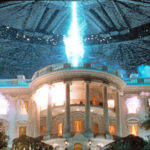Triumph or Havoc
About a year ago, The Scientific American published an interview with an astronomer who had written a book on how the existence of aliens affects religion. If, you know, aliens really do exist, but they passed over that detail and we will, too. So no one had to wonder where this was going, the interview begins by stating that extraterrestrial life “would be a triumph for science” but would “wreak havoc on certain religions” – i.e. Christianity and Judaism, but mainly Christianity.
These are standard views. But I wonder – where do they come from?
In this individual case, it’s plain to see where the view that aliens would mess up Christianity comes from: They don’t get it. This interview gives the same impression as that Russian taunt, at the beginning of the Space Age, that they had gone into space and didn’t find God there. Theists were forced to the conclusion that the Russians thought someone had expected them to find God in space. It’s always a revelation when your opponent doesn’t understand your viewpoint enough to attack it.
The interview has the same quality of an intellectual miss, and not only because the astronomer called the Eastern Orthodox Church a “branch of Catholicism”, which would be huge news to the Catholics, not to mention the Orthodox themselves. One does not need to grasp the distinction between Catholic and Orthodox to understand Christianity, though one probably should before explaining the clash between Orthodox theology and aliens. The miss is far more easily seen in the assertion that evangelical Christians have a hard time dealing with aliens because we believe that “humans are the sole focus of God’s attention”.
And this is where I think of that Cold War taunt. Don’t they understand that one of the most fundamental ideas of Christianity is that God is not parochial, but bigger than the entire universe? After everything that’s been said and written – that God is omnipotent, omniscient, omnipresent, the Creator, Sustainer, and Preserver, infinite, eternal, almighty, what is man that you are mindful of him – after all that, who could believe that humanity was God’s sole focus? It’s like saying Einstein never thought of anything but his cat.1
So I understand why people who misunderstand Christianity think aliens would wreak havoc with it. That is their impression of the religion. But why do they think the existence of aliens would be a triumph for science? It’s not as if the idea of aliens is a scientific theory carefully developed through a rigorous process of observation and experimentation. There is no natural phenomenon that would be explained if aliens were real. (I know what you’re thinking, but no, not even the disappearance of the other sock.)
The idea of aliens doesn’t come to us from science; it’s just the old idea of the other people, shifted from the observed forest to the observed stars. Nor does science offer any proof that the idea is true. Yes, I know – the vast universe, all the galaxies and suns and planets. But it’s a human reaction, and not a scientific principle, to conclude that somewhere in the vastness, someone must be there.2
 To the extent that science has weighed in on the idea, it has not been positive. You’ll notice that we are now talking about alien life in other solar systems. This is because we know too much about our own solar system, and we had to discard the notion of aliens on Mars and push the existence of aliens to regions of the universe we know virtually nothing about. But as science teaches us on what a knife’s edge life precariously balances, it grows more doubtful that there are other planets that, like ours, sustain life.
To the extent that science has weighed in on the idea, it has not been positive. You’ll notice that we are now talking about alien life in other solar systems. This is because we know too much about our own solar system, and we had to discard the notion of aliens on Mars and push the existence of aliens to regions of the universe we know virtually nothing about. But as science teaches us on what a knife’s edge life precariously balances, it grows more doubtful that there are other planets that, like ours, sustain life.
Science, like religion, is essentially neutral on the question of whether aliens exist. We will have our answer when we either encounter aliens, and know for certain they are real, or when we have explored the whole universe, and know for certain they aren’t. Until then, there are no quandaries, theological or otherwise.










































Thought provoking post. Thank you for addressing it. I know in the Fringe community, some tend to think of “alien life” as more so “inter dimensional” rather than “extraterrestrial”. This also fall into the realm of the spirit world and the like. I won’t get into that but I’m sure someone else will.
At the same time, if it’s just us wandering around in the fish bowl, I must say, “What a fish bowl!” This “fish bowl” is beautiful, mysterious, and always grabs our attention. Always something new to discover and learn.
I think people miss the point of how the universe declares the glory of God’s handiwork. We’re so limited in our understanding we think the pinnacle of our being is to find out if there’s other life out there. Probing the depths of God’ s majesty, His brilliance, His creativity, and His knowledge will last us an eternity.
There’s a few episodes of Star Trek: TNG where they give this impression that because there is “alien life” then there’s no need to be believe in the concept of a God who created each individual and for Star Trek, that’s the pinnacle of achievement. I thought about that I read your comment: There is no natural phenomenon that would be explained if aliens were real. The whole premise of TNG (as time went on after Roddenberry became a humanist and then died) is the fallible superiority of creatures who “woke up” in space on planets far, far away. To say it another way, we didn’t create our own existence despite what some would like to think. The universe is then seen as the god of all things which mirror secular, naturalistic science today.
I have a lot of quotations in this response, huh? Oh well. Just hoping to bring my point across. There’s more I could say but I’m sure others are far more eloquent than I.
Yeah, this serves as a reminder that some people seriously think that science and religion are constantly opposed to one another. I can kinda get where they are coming from, seeing how science deals exclusively what can be observed and measured, while religion also deals in things impossible to measure, but that doesn’t mean we need to only listen to one or the other. The average meteorologist is better suited to warn me about upcoming rainstorms than the average priest, but the average priest is better suited to tell me why I should help my neighbor out when the storm damages his roof than the average meteorologist. Science tells us what the world is like, religion tells us what we should do about it.
Great response. At the end of the day, science isn’t the only source of ‘truth’ which is the problem with today’s skeptics. Observations about the world around us is only part of the picture but not the full picture and some people miss that point.
So hope of discovering extraterrestrial life for an adherent of scientism, like an outspoken Bill Nye, includes confirmation of an evolutionary closed loop; a sigh of relief from ever encountering and acknowledging a creator, “case solved.” He gets to hold the fish bowl in his hands while he puts you in it.
Einstein had a cat, evidently.
🙂
Ah! Good to know.
It’s kind of the wrong question to ask, because we need a larger context for these theoretical aliens, i.e., do they have souls?
IIRC, Catholics claim that only humans go to heaven because only humans have souls (ergo dominion of humanity over creation, etc). I don’t know enough about Orthodoxy.
And that opens up a bigger can of worms about WHAT the soul is. How is it different from psychology/self-awareness? Because quite a few “higher” mammals like elephants, orcas, dolphins, and arguably cats and dogs have traits like self-awareness, if that even counts as evidence of higher, humanlike intelligence.
But if ensoulment is not the same as psychology, that doesn’t mean even intelligent extraterrestrial life have souls.
My current thinking is that the soul is “psychological” in that I don’t think it’s specifically spiritual or immediately supernatural, but I think it’s pyschological in a very holistic way — the most holistic sense of a person’s total being. I don’t think it really fits with scientific categories or theories. I would suppose that higher animals are ensouled or approach ensoulment.
I think a creature’s soul is different from the spiritual essence of the thing, which I would guess is the “spirit” of a sentient human, the abstract tenseless concept of what something actually is, anchored in eternity.
That’s something that’s cropped up in some study or another I read once, that soul and spirit are not necessarily synonyms in the New Testament Greek. I don’t remember what they defined the terms as, though.
Humans obviously have something nothing else on earth does, or the question of aliens wouldn’t be nearly as important. Christians call it the soul; a new word for it is sentience. We’ll probably know it if we ever encounter it. Certainly we recognize the absence of it in other creatures.
You’d be surprised how many people think certain animals do have souls. Hinduism apparently teaches that all animals have souls.
True. Then again, some people believe plants have souls. And Hinduism teaches, at any rate, that souls are endlessly recycled into either higher higher or lower life-forms, and nirvana (as I understand it) is essentially the snuffing out of the individual soul. What Christianity means by soul, and what Hinduism means by it, cannot be quite the same thing.
Beyond that, we have the obvious fact, comparing animals to humans, that something is missing.
Are you familiar with the term imago Dei? If not, it’s worth looking up: it’s the Latin phrase for “the image of God”, referring to Genesis: “Let us make man in our image and in our likeness.”
Somehow that sets us apart from every other terrestrial species. Not that we know what that means, exactly. Shoot, we may not even be able to quantify it. It might just be a “positional” thing. Theologians don’t all agree, and they’ve been developing the idea for millennia. (It seems to be what C.S. Lewis was trying to convey in the Space Trilogy with the “Old Solar” word hnau.)
At any rate, I think the important point regarding extraterrestrials and Christianity is whether or not there is an alien species that, like us, is made in the image of God. Seems to me that the Bible doesn’t rule out the possibility. Ours is the only species on Earth that was made in the image of God, but it doesn’t say anything about other planets.
I’ve heard the analogy that the whole “alien life=evolution” theory makes as much sense as giving one computer to a industrial person and expecting them to understand it by giving them another computer. But I like the more nuanced discussion in this post.
Wow, do I agree with this! Usually when I come across the attitude that aliens and Christianity don’t mix, I’m just like, “Read Lewis’ Space Trilogy and get back to me.” So it’s nice to see it laid out clearly and coherently, and with a good sense of humor.
Though I gotta say, if Iowa gets such a reaction from you, clearly you have never been to Wyoming. 🙂
Thanks, Andrea.
And no, I’ve never been through Wyoming …
I really have never seen the conflict between possible alien life and Christianity. There’s nothing in Scripture that absolutely prohibits it. I also like to think of the saying “all truth is God’s truth”. If there are aliens out there . . . great! God created them. If not . . . that’s fine too!